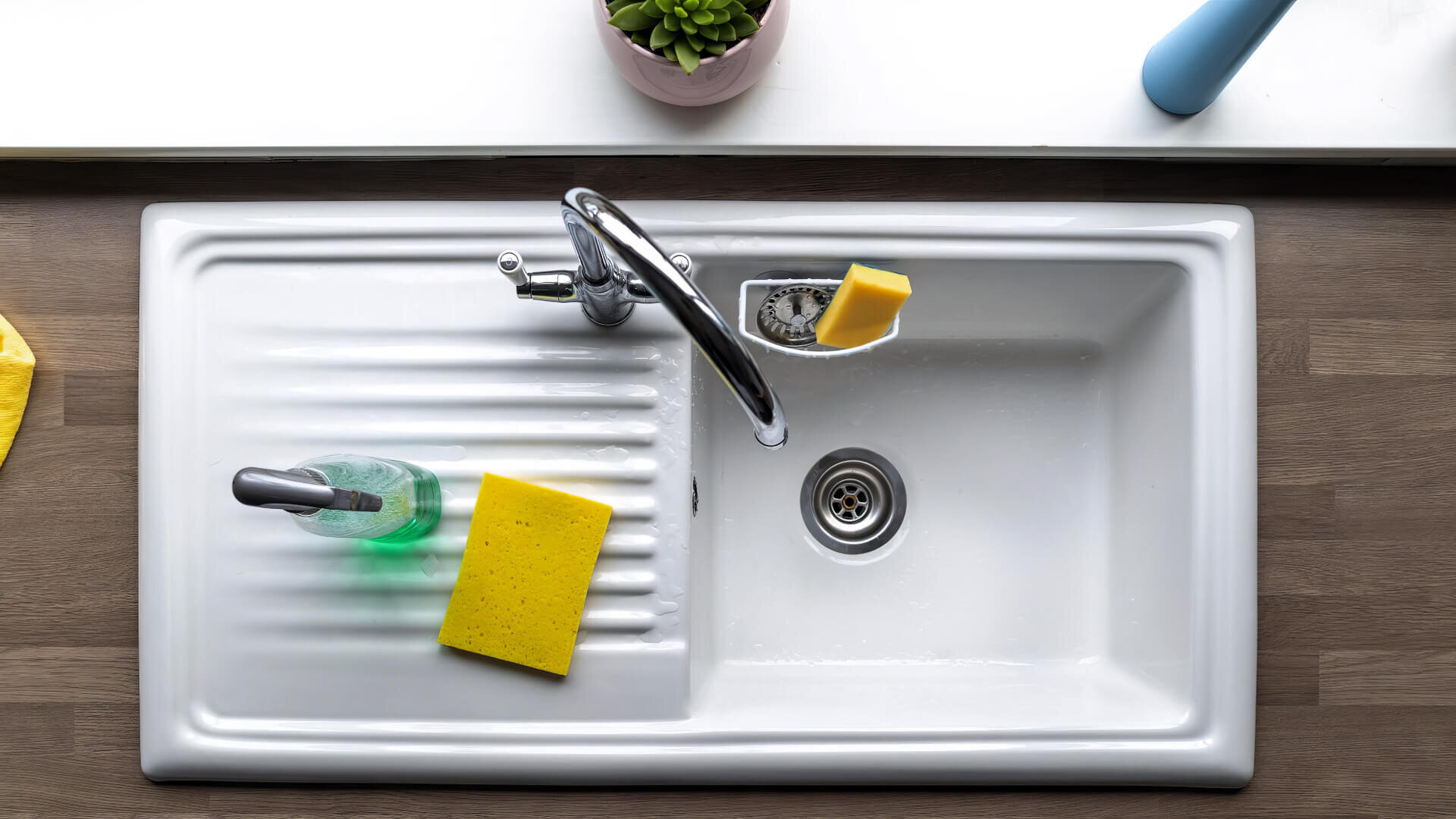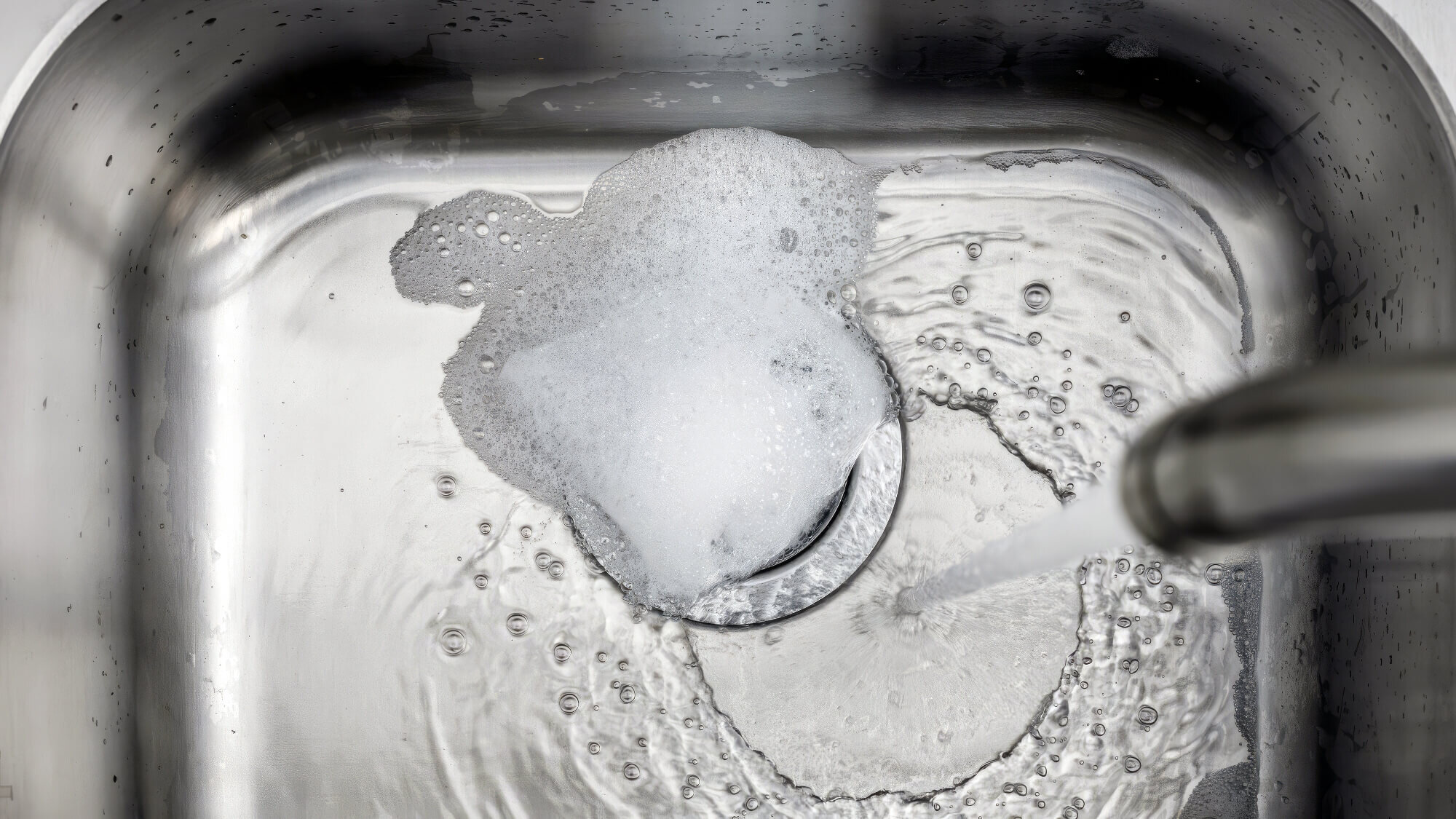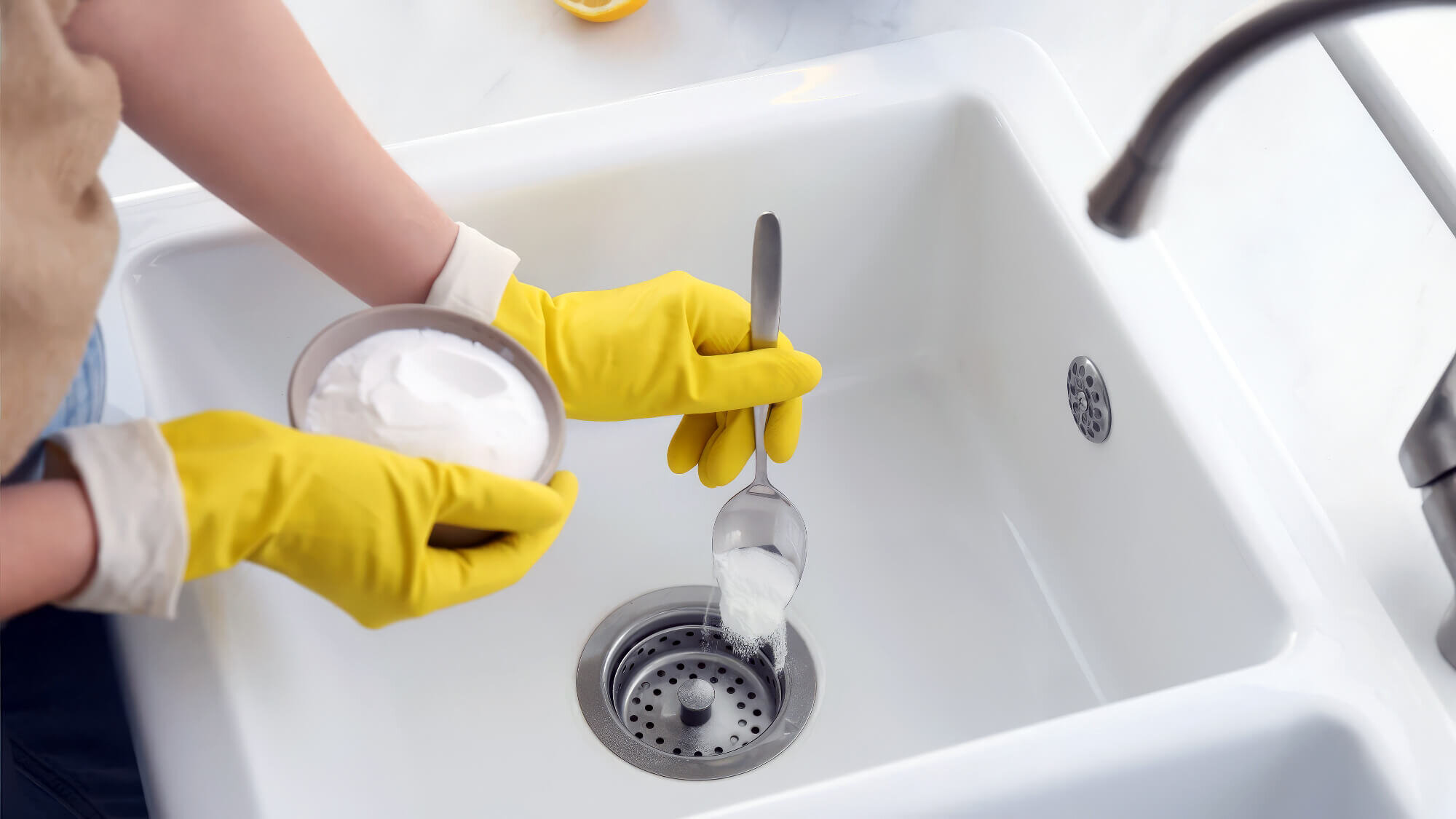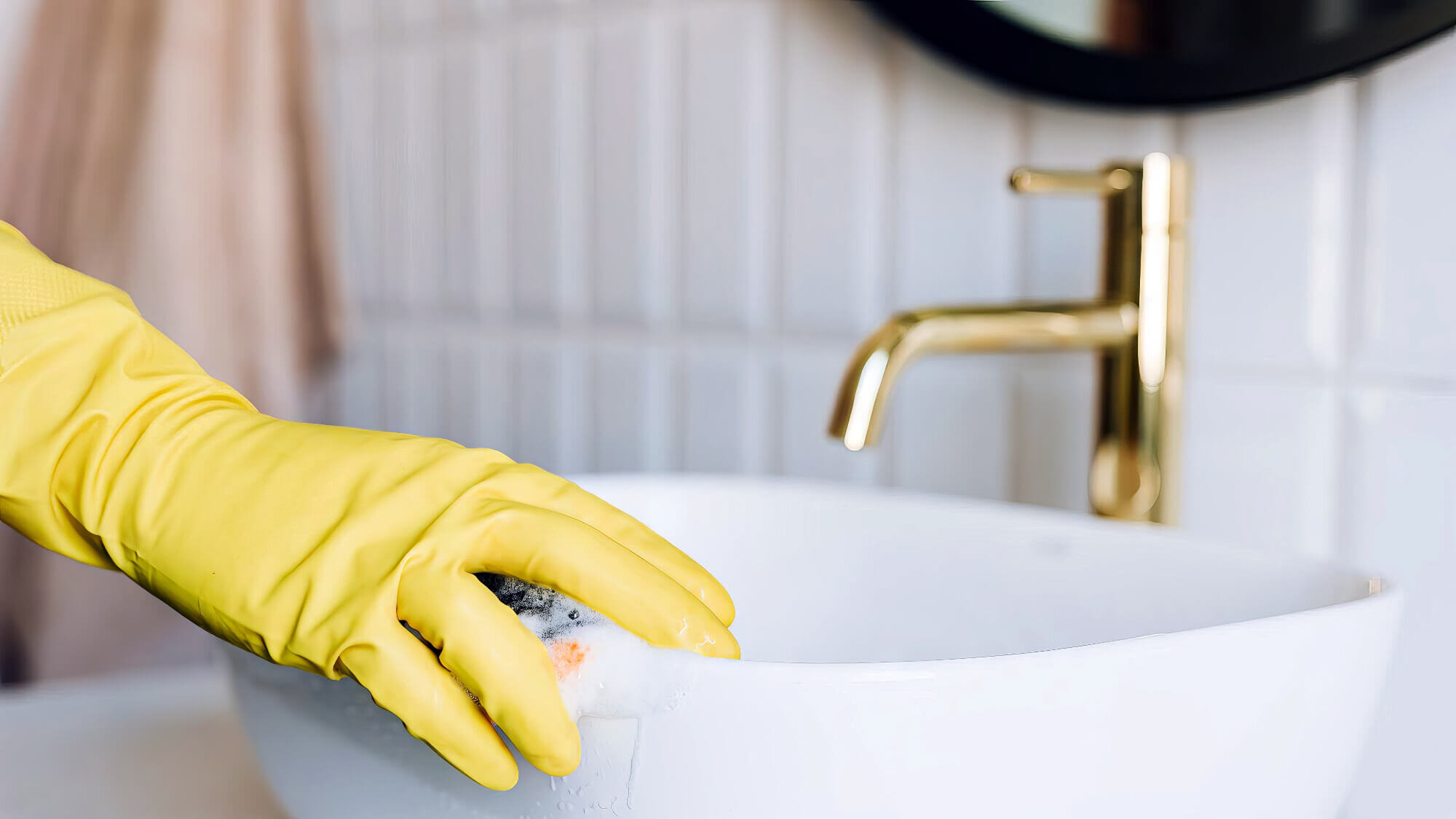Think twice before reaching for that sponge! Kitchen sinks can harbour surprising amounts of bacteria — studies show over 100,000 bacteria per square centimetre. These germs hitch a ride on sponges and spread during food prep, potentially causing more harm than good.

Dirty drains are the culprits behind this hidden threat. Food scraps, grease, and coffee grounds can build up, creating a breeding ground for bacteria and causing unpleasant odours. Blockages are another nasty consequence, bringing your kitchen to a standstill.
This blog is your ultimate guide to tackling kitchen grime. We’ll dive into how often you should clean your kitchen sink drain to keep these problems at bay, ensuring your kitchen stays both healthy and functional.
Why Regular Cleaning is Essential
Regular cleaning is key to keeping your kitchen hygienic and functional. Over time, food particles, grease, and soap scum build up, especially in drains. This accumulation leads to unpleasant smells and provides a haven for bacteria and other nasties.
Food particles provide a rich nutrient source for bacteria, while grease creates a sticky surface that traps more debris, and soap scum adds to the clogging problem.
The impact on hygiene is considerable. Bacteria such as E. coli and Salmonella thrive in these environments, potentially contaminating surfaces and utensils and causing foodborne illnesses.
Mold and mildew can also develop, contributing to respiratory issues and allergic reactions. A neglected kitchen environment can quickly become hazardous to health.

Keeping your drain clean is vital for overall kitchen hygiene and function. It ensures water flows freely, preventing any stagnant water that can harbour bacteria. Regularly cleaning drains and surfaces helps eliminate health risks, promoting a safer cooking space.
Additionally, it prevents clogs that can lead to costly plumbing issues and kitchen downtime. Routine cleaning is a simple yet effective measure to ensure a healthy and efficient kitchen.
Signs Your Kitchen Sink Drain Needs Cleaning
Keeping your kitchen sink drain clean is crucial for a healthy and efficient kitchen. Here are some common indicators that it’s time to clean your drain:
Slow Drainage
Slow drainage is one of the first signs of a clogged or dirty drain. If the water isn’t going down as quickly as it should, there’s probably a build-up of food particles, grease, and soap scum.
Unpleasant Smells
Foul odours emanating from your drain are a clear sign that it needs cleaning. These smells typically result from decomposing food particles and grease trapped in the pipes.
Gurgling Noises
If you hear gurgling noises when water drains, it indicates that air is trapped in the pipes due to a blockage. This is a sign that your drain is not functioning properly and needs attention.
Visual Signs
Residue around the drain, such as grease or food particles, is a visual cue that your drain is dirty. Additionally, if water backs up into the sink when you run the faucet, it’s a definite sign of a blockage.
It’s important to address these signs quickly to prevent more issues. Ignoring them can lead to severe clogs, bad smells, and even plumbing damage. Regular cleaning keeps your kitchen functional and hygienic, ensuring a safe spot for cooking.
Recommended Cleaning Frequency
Keeping your kitchen sink drain clean is crucial for hygiene and efficiency. Here are some general guidelines on how often to do it:
General Guidelines
For the average household, cleaning the kitchen sink drain at least once a month is recommended. This routine helps prevent the build-up of food particles, grease, and soap scum that can lead to clogs and unpleasant odours.
Influencing Factors
The frequency of cleaning can vary depending on several factors:
- Amount of Cooking and Dishwashing: Households that cook frequently and use the kitchen sink extensively for dishwashing may need to clean their drains more often, such as every two weeks. Heavy use can lead to quicker accumulation of debris and grease.
- Household Size: Larger families or households with multiple members will generate more waste, necessitating more frequent cleaning. In such cases, a weekly cleaning routine might be more appropriate.
- Type of Food Prepared: If you often cook greasy foods or foods that produce a lot of residue, like pasta or rice, you might need to clean the drain more frequently to prevent build-up.
Cleaning Routine
For an average household:
- Weekly Maintenance: Pour boiling water down the drain once a week to help dissolve grease and clear minor build-ups.
- Monthly Deep Clean: Use a mixture of baking soda and vinegar followed by hot water. This natural solution helps break down organic matter and remove odours.

For larger families or heavy kitchen use:
- Twice-Weekly Maintenance: Pour boiling water down the drain twice a week.
- Bi-Weekly Deep Clean: Use the baking soda and vinegar method every two weeks to ensure the drain remains clear and odour-free.
Regular maintenance tailored to your household’s needs will help keep your kitchen sink drain clean and functional, preventing major issues and ensuring a healthier kitchen environment.
How Do You Clean a Kitchen Sink Drain?
Keeping your kitchen sink drain clean is essential for maintaining a hygienic kitchen. Here are several effective methods, including natural solutions and commercial cleaners:
Natural Solutions
Baking Soda and Vinegar
- Pour Baking Soda: Start by pouring about half a cup of baking soda down the drain.
- Add Vinegar: Follow with one cup of white vinegar. The mixture will fizz and bubble, helping to break down residue.
- Wait: Let the mixture sit for 15-30 minutes to allow it to work on the build-up.
- Flush with Hot Water: Finish by pouring boiling water down the drain to flush out loosened debris.
Salt and Baking Soda
- Mix Ingredients: Combine half a cup of table salt with half a cup of baking soda.
- Pour into Drain: Pour the mixture down the drain.
- Add Boiling Water: Follow with a kettle of boiling water. This combination helps dissolve grease and grime.
- Wait and Rinse: Let it sit for a few hours or overnight, then rinse with hot tap water.
Commercial Drain Cleaners
Enzyme-Based Cleaners
- Read Instructions: Follow the manufacturer’s instructions for the correct amount to use.
- Pour Cleaner: Pour the recommended amount of enzyme-based cleaner down the drain.
- Wait: Allow it to sit for the specified time, typically overnight.
- Flush with Water: Rinse the drain with hot water to clear out any remaining debris.
Chemical Cleaners
- Safety First: Wear gloves and ensure proper ventilation.
- Pour Cleaner: Carefully pour the specified amount of chemical cleaner down the drain.
- Wait: Let it sit for the recommended time.
- Flush with Water: Rinse thoroughly with hot water.
Importance of Environmentally Friendly Products
Using environmentally friendly and safe products is crucial to avoid harmful chemicals that can damage pipes and pollute water systems. Natural solutions like baking soda and vinegar are effective and safe for both your plumbing and the environment.
Enzyme-based cleaners are also a good choice as they break down organic matter without harsh chemicals. Prioritising these methods helps protect your home and the planet.
Preventative Measures to Keep Your Drain Clean
Keeping your kitchen sink drain clean and clog-free requires some simple preventative measures:

Use a Drain Strainer
Place a drain strainer over your sink drain to catch food particles and debris. Empty the strainer regularly to prevent build-up.
Avoid Pouring Grease Down the Drain
Instead of pouring grease or oil down the drain, collect it in a container and dispose of it in the trash. Grease can solidify and cause blockages.
Keep Your Kitchen Fresh with Regular Drain Cleaning
Regular kitchen sink drain cleaning is essential for maintaining a hygienic and functional kitchen. Over time, food particles, grease, and soap scum can accumulate, leading to clogs, unpleasant odours, and even potential health hazards due to bacterial growth.
By adopting a regular cleaning routine, such as using natural solutions like baking soda and vinegar or commercial drain cleaners, you can prevent these issues and ensure that your kitchen remains a safe and pleasant environment for cooking and cleaning.
We encourage you to implement the suggested cleaning methods to keep your kitchen sink drain in top condition. However, if you encounter persistent blockages or need professional assistance, Big Blue Plumbing is here to help.
Our expert plumbers are equipped to handle any drain-related issue, ensuring your kitchen drains remain clean and functional.
Don’t let a blocked drain disrupt your kitchen routine — contact Big Blue Plumbing today for reliable and efficient blocked kitchen sink service.
Keep your kitchen fresh and running smoothly with our professional assistance.



